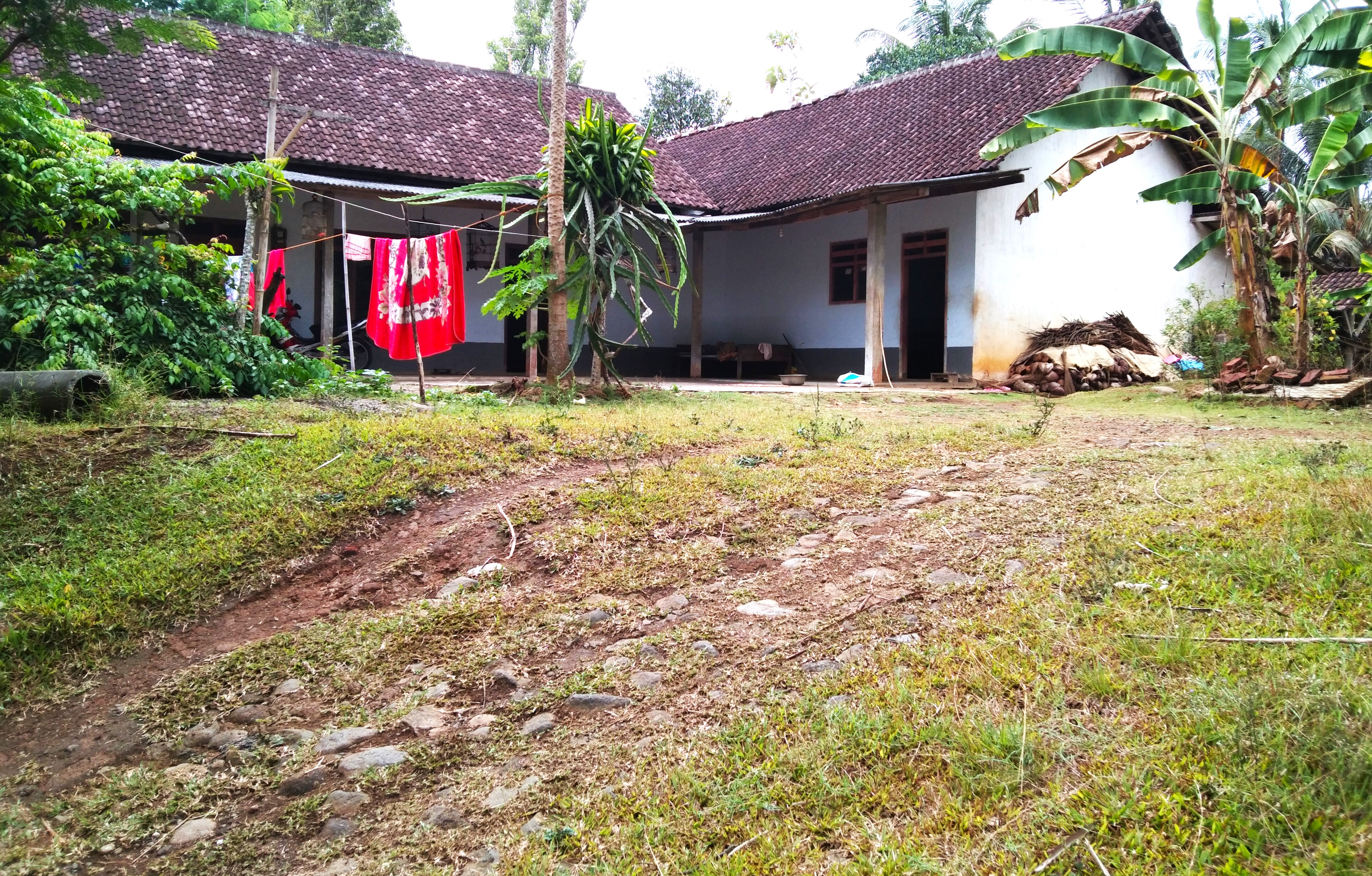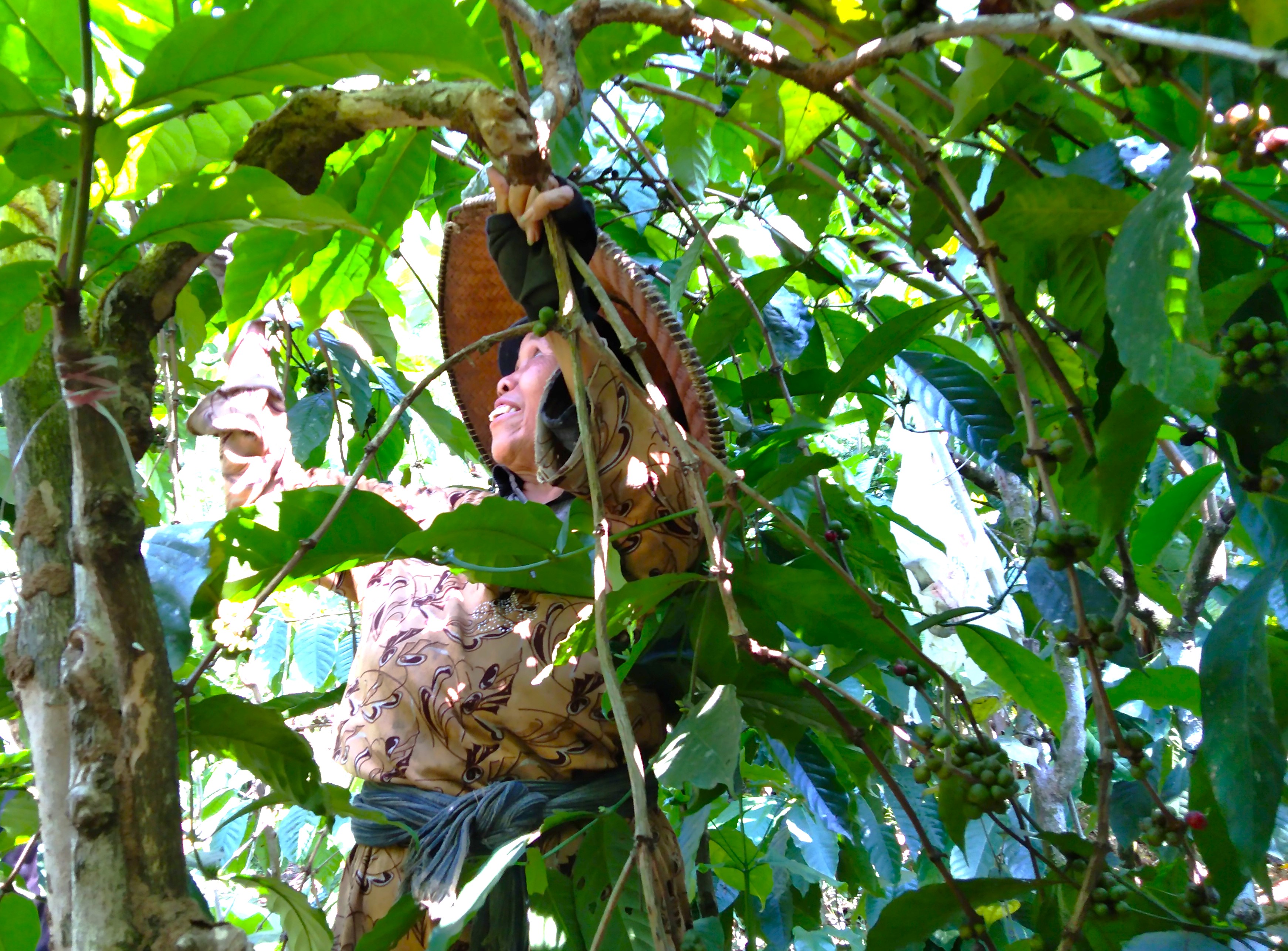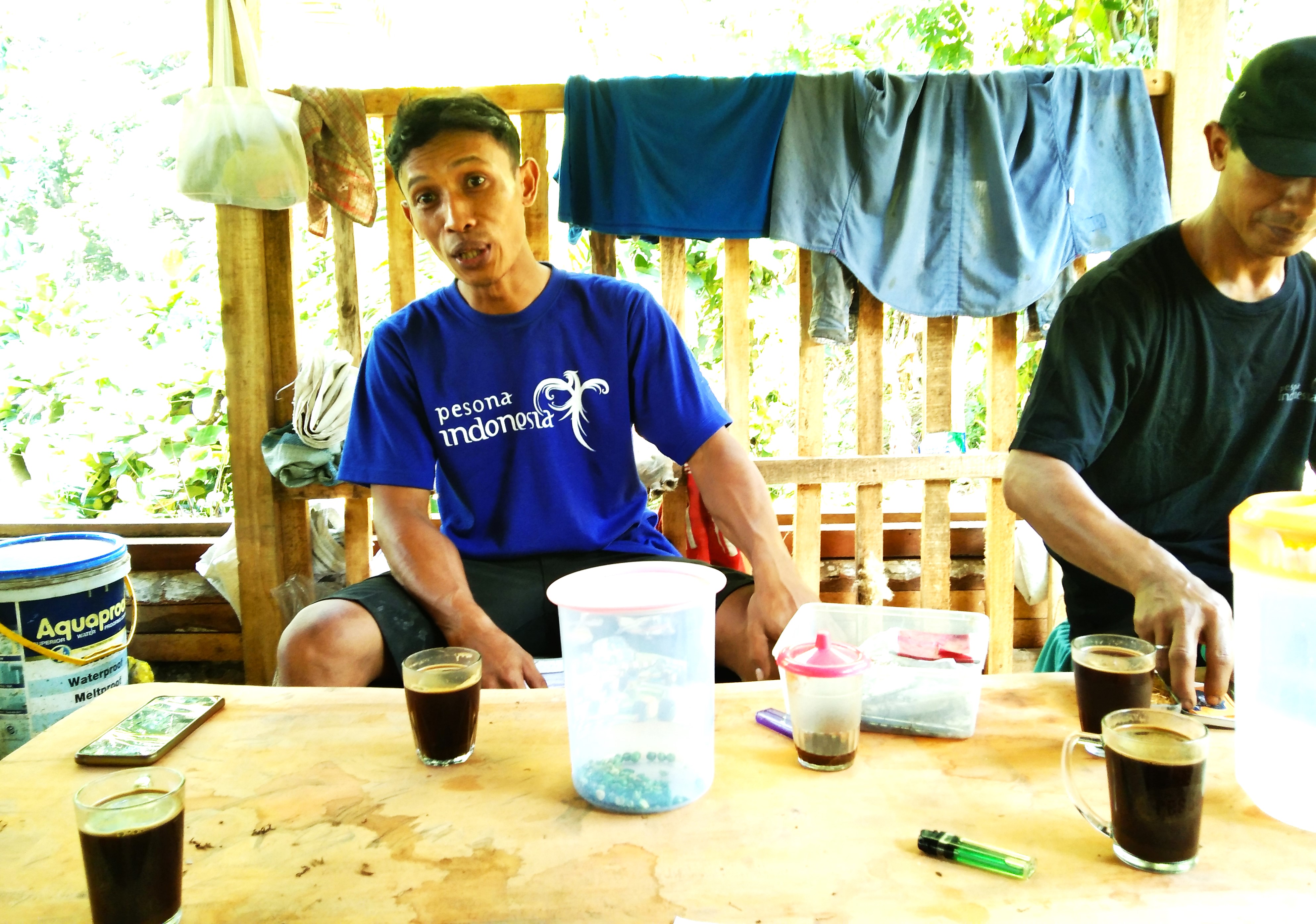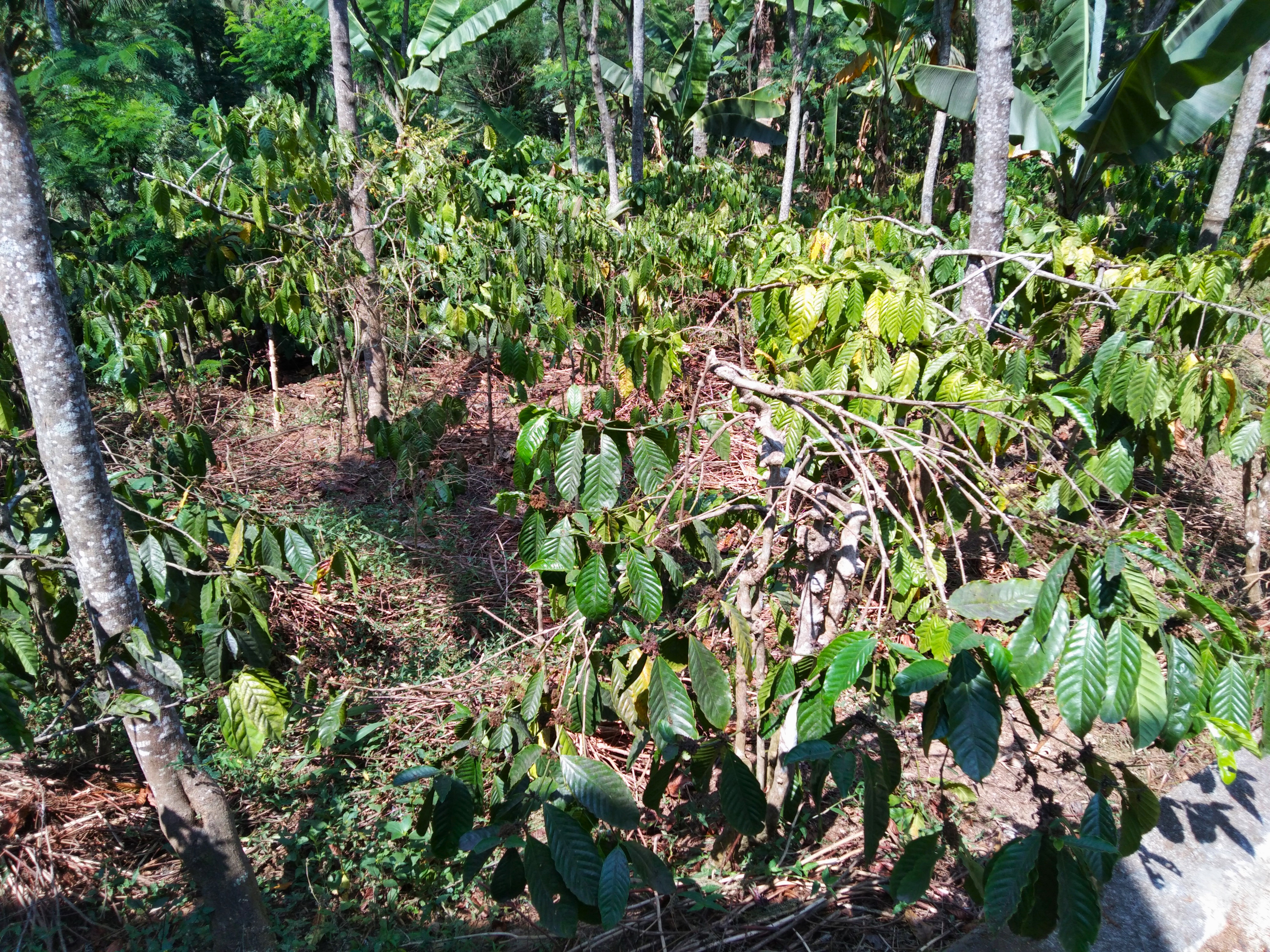
Sons of Sumberurip, Between Coffee Leaves and Goat's Call
One morning, as the first light kissed the earth, a new story began to unfold. The sun took up its slow ascent, casting warmth upon the waking world and the ground still felt moist because of rain last night. And, the green color of the coffee fruit spread throughout the garden. Though still draped in vibrant green, it beckoned with quiet allure to all who wandered through the coffee garden. Sumberurip Village, located on the slopes of Mount Kawi, its people depend on the fertility of the soil and the surrounding nature for their livelihood. Mountains are the majestic pillars of nature. And, nature as a photo studio that has no partitions. Nature stands as the doorway, inviting us to step into the vastness of the universe and feel the Creator’s infinite embrace.
A young traveler and coffee lover named Hery arrived in Sumberurip village located on the eastern slope of Mount Kawi. He got information about Sumberurip Village from Sabato Kaliwuan, a friend who had visited. Sabato Kaliwuan said that Sumberurip Village is a place that has not been touched by many tourists and is indeed ideal as an alternative destination for anyone who loves coffee. Not only coffee plantations, but most residents also raise goats. A village that opens its arms to coffee lovers and souls seeking the simplicity of the villagers' humble way of life.
Hearing the story, Hery imagined that the village was still beautiful. Its location was on the slopes of the mountain, which certainly had cool air spreading to every place. And, he imagined being able to trek along the up and down roads, among the coffee plantations. Impatient to be able to visit the village soon, Hery began planning his visit by arranging a schedule and starting to look for information about the trip to the village. Hery hoped to get new empirical experiences by involving himself with the activities of the villagers; in the coffee plantation and the goat pen. Curious and enthusiastic, Hery decided to visit this village with Sabato Kaliwuan, hoping to experience authentic rural life while also exploring two things that were very interesting to him: coffee and goat farming.

Hery arrived at Sumberurip Village, it was true what he had imagined about the mountainside village. The cool air and the green scenery of the trees colored his journey. The colorful wildflowers spread throughout his view. The mountain air caressed his senses, soothing his breath with its cool embrace, while the wind whispered through the trees, their leaves waving a silent greeting. Exhausted and fatigued from urban activities paid off in this place. The paved village road that was still relatively quiet allowed him freely to observe the new place.
In his heart, this village is an ideal destination, but why does this place seem to be ignored by travelers? Hery saw a goat pen next to a resident's house, adding to Hery's belief that he was really in a village. The goat pen gives the impression of a rural atmosphere full of activity. His hopes paid off. Throughout the journey, he continued to observe but did not see a single coffee plantation. Indeed, the residents' coffee plantations were located a few meters behind their houses.
He arrived at one of the houses recommended by his friend. That is a house on a small road measuring 2 meters. There was a simple house with a large yard, and next to the house, there were several coffee trees. His second hope was paid off. In awe, he stepped forward to several coffee trees.

Hery was surprised by a voice greeting him 'welcome to my house'. Hery returned the greeting and shook Mr. Roni's hand. He was one of the coffee farmers of Sumberurip Village. The two of them chatted for a few minutes in the yard, and Heri pointed to several coffee plantations in the garden next to the house. Then, Bapak Roni invited Hery into the house, inviting him to sit down. A few minutes later, Mr. Roni came out serving him hot coffee in a glass decorated with flowers.
Enjoying a cup of coffee while socializing, and talking about coffee. Mr. Roni spoke of the rhythms of village life—of mornings in the coffee fields, the goats' soft bleat by the pen, and the quiet bustle around his home. The coffee drink was finished, and without delay, Mr. Roni invited Hery to get ready to walk to the coffee plantation. Herry enthusiastically accepted the invitation while standing up from his seat. Hery walked beside Mr. Roni while carrying some equipment. Bapak Roni's coffee plantation is quite large.
Coffee in Sumberurip Village is planted with the concept of 'shade-grown coffee'. Being in a coffee plantation feels like being in the middle of a forest because various types of large trees provide shade for the coffee plants. Mr. Roni began to tell the story of the history of his coffee plantation. Hery got information about how to plant and care for coffee. Quality coffee beans depend on care, to coffee processing which requires a long process to be enjoyed by coffee lovers at home and in coffee drinking places.

The activities in the coffee plantation finished around noon. Bapak Rony and Hery tidied up their garden equipment, then walked home via different routes. The two of them walked along the up and down roads, interspersed with flat winding roads across the residents' plantations. Animal sounds were heard along the way home. Every now and then they stopped to rest, while pointing out the spice plants that grew well among the coffee trees. Meeting with residents who were still active in the plantation, Mr. Roni stopped to chat for a moment while introducing Hery who had come from far away to explore coffee and goat farming.
Arriving at Mr. Roni's house. They both washed their hands and feet. Entering the house, there were two drinks on the table, coffee and mineral water. Bapak Roni's wife invited Hery to sit down, but she was still busy going in and out carrying several dishes. Putting them down on the table one by one, then going in and out carrying something. Hery offered to help prepare lunch. However, Mr. Roni's wife refused, because it was her job. In Javanese tradition, guests are revered like royalty, and the host, with humble pride, offers the bounty of their land, each dish a gift from the heart, served with the grace of hospitality.
Time wove its threads into Hery's soul, drawing him closer to the heart of Sumberurip, where every moment felt like a familiar embrace from the land itself. Hery watched what Bapak Roni and his wife did even on the plantation or at home. Heri adapted to the rhythm of life of the residents of Sumberurip Village and began to feel a simple, friendly, and sincere lifestyle in serving anyone who visited Sumberurip Village. The drinks and food he enjoyed were not just dishes, but a sincere process without looking at who visited. Coffee is a long process that symbolizes the villagers who are not spoiled. They dedicate their spirit and life to coffee.

The night passed so quickly, and Hery felt like he woke up earlier, because he was awakened by the natural alarm from around Mr. Rony's house. The sound of goats, crowing chickens, the sound of birds, and the sound of leaves rubbing against each other in the wind, became the soundscape of Sumberurip Village. He didn't hear those sounds in the city where he lived. Listening to the sounds outside answering each other, he felt like he was in the forest.
Hery felt like he woke up earlier than Bapak Rony's family, it turned out that in the kitchen there was the sound of trickling water, metal objects colliding, footsteps, and the sound of sandals rubbing against the ground, without hearing the sound of living creatures. Hery then went to the kitchen, it turned out that Mr. Rony's family was busy working in the kitchen without making a sound. Heri got involved in helping them in the kitchen. This time, Mr. Rony's wife did not refuse, because she wanted to allow Hery to get involved early in the morning with activities in the kitchen. Coffee seemed to be a mandatory dish before breakfast. Mr. Rony's wife invited Hery to drink the coffee that had been served.
Bapak. Rony feeds some of his goats in his backyard. Hery approaches and helps Mr. Rony. Routine activities of the residents of Sumberurip Village before leaving for the plantation. Livestock is their priority. From livestock, they get additional income while waiting for the coffee harvest. Sunlight begins to enter their house through the ventilation. The activity of a few minutes makes Hery feel the persistence of the villagers again. Mr. Rony invites him back into the house to enjoy breakfast that has been served by Mr. Rony's wife. While eating, occasionally there is a chat about goats.

This time, Mr. Rony invited Hery to visit a goat pen that was not far away and reached by walking along a small river whose water never receded because it came from a source. And, the river was an irrigation channel that flowed to the residents' rice fields. Mr. Rony told about the pen that would be visited. The pen was quite large compared to his pen. There were several types of goats in the pen and the condition was very pleasant. The owner was indeed skilled in caring for goats. Residents did have an emotional closeness to goats. They cared for goats like caring for children, and each goat had its own uniqueness, and their treatment was different. Livestock goats were a profitable investment. They could quickly sell them to meet urgent needs that could not be postponed. The goats came and went. Most of them raised goats from a young age. Goats were also their entertainment.
Unnoticed, Mr. Rony's steps stopped at the destination. Heri was amazed to see the goat pen which was quite spacious. Mr. Rony introduced Hery to the owner of the pen named Bapak Rudi. Hery felt a friendly smile. Entering the goat pen, Hery was accompanied to see the condition of the pen. The pen was clean, and the goats were also pleasant. They looked clean, well-groomed, and fat too. Bapak Rudi explained to Hery how to raise and raise goats. Caring for and maintaining the cleanliness of livestock. Again, Heri was amazed. Mr. Rudi fed his livestock with fresh food. There were several types of grass planted in his garden which was not far from the pen. There are many benefits to being friendly and caring for nature. Organic food for goats is not difficult to obtain.
We only care for nature, and nature will provide whatever we need. During the season and excessive rainfall, Bapak Rudi more often feeds the goats with jackfruit (Artocarpus heterophyllus) leaves, straw, papaya leaves, lamtoro (Leucaena leucocephala) leaves so that the goats remain healthy and fat. The grass will be taken when it is no longer wet and can be saved during the dry season. Because, goats don't want to eat wet grass.
In Sumberurip Village, the goat pens are more than just homes for livestock; they are living hubs of connection, where the rhythm of daily life beats. Here, mornings are filled with lively exchanges, sharing knowledge and stories about the animals, while afternoons bring a peaceful return to the pen, where the act of feeding the goats eases fatigue, and the space becomes a sanctuary for both the body and soul.
The activities of the men of Sumberurip Village between the coffee plantation and the livestock pen. Home is the destination if all the work in the coffee plantation and the pen is finished for the day. Home is the last destination where they feel calm meeting and enjoying free time with their wives and children at sunset. Warmth arises when they hear stories from their children and wives. And, the calmness of the wife arises when her husband tells a story about the coffee plantation or livestock. And, they wait for each other to tell a funny story today in the garden or in the pen about the behavior of the goats.
The residents of Sumberurip Village were able to transform the pen into something like a cafeteria. In front of the pen, a place to sit and a simple table were prepared. Anyone who comes will definitely be happy to linger. Talking about goats is endless. If other people meet and chat, they can't get away from talking about other people. However, it's different in the pen, their chat is about goats, feed, livestock-related problems; diseases and other disorders that can threaten the lives of livestock.

Coffee is a must-have for anyone who comes to the pen. Coffee seems to be a trigger to find a fun theme about goats. If several people come to the pen, then coffee continues to increase. Being in the pen is as if talking to a livestock expert or veterinarian. If one of them tells of his experience of successfully curing his livestock with herbal concoctions, then it will be new knowledge for the others. They tell details about the process of processing herbs, their composition, how many times to drink them and so on.
They tell each other stories based on their empirical experiences which have indeed proven to be harmless. Heri was also involved in the conversation by asking several questions. And, one by one they answered with almost the same answers accompanied by explanations that satisfy the mind and soothe the soul. It is not uncommon for the conversation to be surprised by laughter simultaneously, which causes the goats in the pen to sound each other. As if the sound of human laughter disturbed their peace while enjoying their food. Or it could be that the goats heard the fun chatter of several humans in the pen, and they agreed by sounding each other. Living together in a cage is not only for humans, but also applies to livestock.
Hery's togetherness with the residents in the livestock pen was limited by time. Mr. Rony then said goodbye to them. From the pen to Mr. Rony's house, again walking through a different path. Hery was satisfied because his third hope had been paid off, which was to experience trekking. The first day of the journey home from the garden passed through a road that went up and down, dividing the coffee plantation, shaded by shady trees along the way, meeting residents in other gardens witnessing different things, with goat farmers in a pleasant pen. In Sumberurip Village, Hery's empirical experience became richer. Close to nature, involved in the activities of the residents, melting into conversations in the pen with the goat farmers.
Heri was very grateful to get what his other friends might not have gotten. He thanked his friend. He learned a lot from his trip to Sumberurip Village. The villagers live in the countryside, but they are proud of their village and its natural wealth. They are the ones who are truly rich. Rich with togetherness, fertile and abundant nature and their lives are always in harmony with nature. The lifestyle of the villagers has made Hery think. They enjoy conditions that are quite realized with simplicity and sincerity. The villagers do not only work hard, but are always sincere in sharing. Guyub is the principle of the residents of Sumberurip Village. Although time continues to change, the village will always live with a rhythm of life that is very different from that in the city.

Coffee plantations, spices also grow well among the coffee trees. The trees that shade the coffee plantations seem to be protectors from various threats. Fun and healthy goats are an inseparable part of the villagers. Likewise, Mr. Roni and his wife, as well as Mr. Hasan, will never stop maintaining and preserving the balance between the garden and the livestock pens and maintaining sustainability within the family.
Hery assured himself, although lifestyles have changed, life in the village still provides space for happiness in simplicity. For Heri, they get peace in a harmonious life side by side with nature. Encouraging each other in various situations and conditions. True togetherness seems to only be owned by villagers. And, we can only feel it from a distance.

